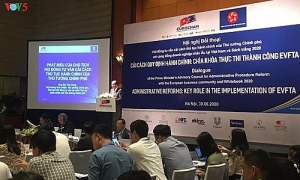Reform imperative to tackle red tape in business
At last week’s conference on promoting economic freedom on doing business and enhancing market efficiency, held in Hanoi by the Vietnam Institute for Economics and Policy Research and the Friedrich Naumann Foundation, experts emphasised that there have not been many actual changes in reforming admin procedures and business conditions.
 |
| Reform imperative to tackle red tape in business, illustration photo/ shutterstock |
The Law on Investment 2014 defined 267 conditional business sectors, reduced to 243 in the amended law in 2016 and to 227 in 2020.
However, in the view of Nguyen Minh Thao, head of Business Environment and Competitiveness at the Central Institute for Economic Management (CIEM), preliminary reviews of some sectors have showed that the number of business conditions, in reality, is much more than noted in the law.
“While cutting down business conditions, they merged some sectors or expanded the coverage of sectors instead of removing conditions,” Thao said. “Trading in aquatic feed and animal feed would be one example, but this industry covers a broader base than the sectors specified in the specialised legislation, namely the Law on Fisheries and the Law on Livestock Production. Thus, the naming of this sector is the mechanical assembly of two different areas of state management.”
In construction, there are too many certificates requested. “In six areas of the construction sector, there are dozens of certificates, and they define some types for every certificate. It is too complicated for enterprises to comply with regulations and procedures that overlap and are unclear,” Thao said.
In the 2017-2019 period in particular, the government issued 40 guiding documents on improving the business environment, leading to the drastic implementation and plenty of business conditions removed. However, inevitable restrictions in recent years has stalled the process.
CIEM former general director Nguyen Dinh Cung said that businesses are not finding conditions any easier than a decade ago. “In addition to external factors from around the world, enterprises also claim that regulations related to investment procedures and land are getting stricter, and compliance costs more than ever before,” Cung said.
Vietnam lacks breakthrough reforms to create new vitality for development, while state agencies are not flexible in adjusting some policies and management methods, Cung added, noting that the number of inspection and administrative sanctions is seemingly getting higher.
According to the results of the 2021 Provincial Competitiveness Index, 60 per cent of enterprises find it difficult to implement a conditional business licence. The percentage of enterprises paying informal expenses for the issuance of conditional business licence was 61.4 per cent, and conditional business licence troubles are the reason for 21.7 per cent of enterprises to postpone or cancel business plans.
In the view of Fred McMahon from Canada’s Fraser Institute, institutional improvement and the promotion of business freedom are indispensable requirements at this time because this is how Vietnam can maintain a fast and sustainable growth rate.
“For Vietnam to maintain fast growth as it becomes richer, economic policy will have to become more competitive,” McMahon said. “Many poor nations grow quickly and undertake some economic reforms. Growth was strong from a low start but they fail to continue economic reform, growth slows down, and they fall into the middle-income trap. Out of 101 middle-income nations in 1960, only 13 became high-income by 2008.”
McMahon highlighted the many advantages of the country in terms of size and location, and noted shifting economic patterns could benefit it. “With a competitive economic policy, the nation will move to ever increased prosperity,” he urged.
Over the past eight years, Vietnam’s status in investment and business climate on the global rankings have improved remarkably. While in 2014, Vietnam’s position in the World Bank’s Doing Business was 78, it was 70th among 190 economies in 2019. The country also jumped 23 places in two years in its economic freedom index, placing 84th in 2022.
To continue that improvement, Nguyen Dinh Cung emphasised that stabilising the macroeconomy is essential – however, it should be more flexible in management. “Most woes come from external influences that we fail to control. Therefore, the management should follow the market movements rather than suppress the market,” he said.
Cung emphasised that this is the time to focus on three major orientations. “These include maintaining macroeconomic stability by appropriate solutions, promoting reasonable growth, and ensuring social security; reforming institutional strongly and consistently as a strategic breakthrough to restore market and investor confidence; and extensive international economic integration through bilateral and multilateral free trade agreements,” he said.
 | Administrative reforms – key to unlocking EVFTA In the times of post-pandemic recovery, the EU-Vietnam Free Trade Agreement (EVFTA) and administrative reforms will be the key to boosting trade relations between Vietnam and the EU. |
What the stars mean:
★ Poor ★ ★ Promising ★★★ Good ★★★★ Very good ★★★★★ Exceptional
 Tag:
Tag:
Related Contents
Latest News
More News
- State corporations poised to drive 2026 growth (February 03, 2026 | 13:58)
- Why high-tech talent will define Vietnam’s growth (February 02, 2026 | 10:47)
- FMCG resilience amid varying storms (February 02, 2026 | 10:00)
- Customs reforms strengthen business confidence, support trade growth (February 01, 2026 | 08:20)
- Vietnam and US to launch sixth trade negotiation round (January 30, 2026 | 15:19)
- Digital publishing emerges as key growth driver in Vietnam (January 30, 2026 | 10:59)
- EVN signs key contract for Tri An hydropower expansion (January 30, 2026 | 10:57)
- Vietnam to lead trade growth in ASEAN (January 29, 2026 | 15:08)
- Carlsberg Vietnam delivers Lunar New Year support in central region (January 28, 2026 | 17:19)
- TikTok penalised $35,000 in Vietnam for consumer protection violations (January 28, 2026 | 17:15)






















 Mobile Version
Mobile Version